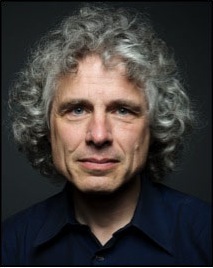 Age-old sceptic about cultural evolution, Steven Pinker
weighed
in on the topic again a few months back, saying:
Age-old sceptic about cultural evolution, Steven Pinker
weighed
in on the topic again a few months back, saying:
Human cultural innovations are quite different from the blind mutation and recombination that supply the raw material for bona fide natural selection. I'm happy to concede that this is a difference in degree. Sure, natural selection does not require blind mutation; it can add value to intelligently designed or directed variants. And sure, the brainchild of a single innovator generally must be tinkered with and combined with other innovator's brainchildren through social networks before it is of any use.But what a difference in degree! Genetic mutations and recombinations are strictly typographical, twiddling the As, Cs, Ts, and Gs with no foreknowledge of their effects on the organism's interactions with the world.
I think the "difference in degree" business counts as progress. However, this is mostly the same mistakes that Pinker was making in 1997 all over again. This illustrates the power of heritage constraint in Pinker's thinking.
I have a history of trying to straighten Pinker out on this topic - so: here we go again:
To start with, human cultural innovations are best compared with organic adaptations. Knives with claws, jackets with fur, sonar with echolocation, etc. Comparing cultural innovations with mutation and recombination unfairly misses out the roles of development and selection in the origins of organic innovation. Pinker finds that his own comparison doesn't make much sense - but that's because he's making a rather silly comparison. If the intention was to describe the memetic forces of mutation and recombination (excluding selection and development), you can't use the term "human cultural innovations" to describe these - it is just too misleading.
The other point is that the idea that organic recombination doesn't involve foreknowledge kind-of misses the point of sexual selection. Perhaps strictly there's no such thing as foreknowledge - for genes or memes - but what we do have is prediction, and both genetic and memetic evolution make use of it.
When an organism chooses a mate, they are deciding who to recombine their genes with. This decision is not too "typographical" - it involves creating a complex world model and evaluating the expected consequences of various mate choices. So: recombination of memes isn't pure "typographical twiddling", but neither is recombination of genes. Both genetic and memetic recombination can involve learning, experimentation - and other phenomena associated with complex cognition. It just isn't true that prediction of expected results and complex cognition is involved in cultural recombination and not organic recombination.
This criticism illustrates a common pattern in criticisms of memetics - people complain that genetic evolution and memetic evolution are more different than memetics claims - and it turns out that this isn't because of their views of cultural evolution, but rather because of overly-simplistic views about how organic evolution works.
Pinker closes with:
But unlike the case of genetic evolution, where selection assumes the full burden of generating adaptation from the vast space of genetic possibilities, most of the work done in exploring the space of logically possible ideas must be attributed to the organization of the brain.We can be more specific than this. The search of possibilities is performed by an algorithm involving copying with variation and selective retention within the brain. Any non-trivial optimization strategy necessarily involves such an evolutionary process. Selection is the "narrowing" force in evolution. Whenever adaptations are generated from a vast space of possibilities, selection is involved. That's just the terminology biologists use to describe such "narrowing" processes. So: it turns out that selection is doing most of the work in generating cultural adaptations too. Pinker claims that selection "assumes the full burden" of generating adaptations in the organic realm, but that's not strictly correct - you need a source of variation to generate organic adaptations too.










No comments:
Post a Comment